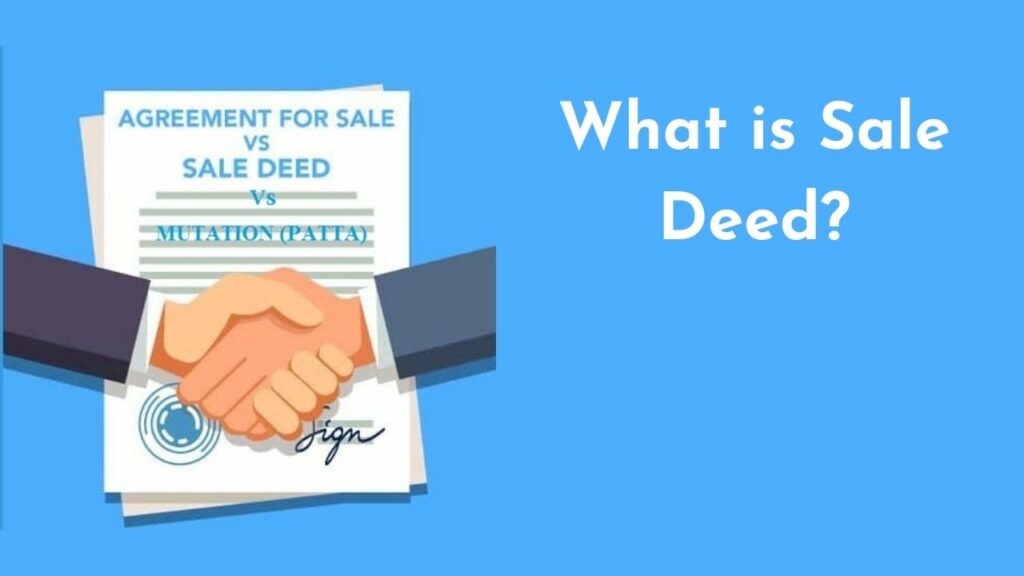What is Sale Deed?
A sale deed is a legal document that shows the transfer of property from the vendor to the consumer. The property-purchase procedure is completed when the selling deed is registered. A sale deed is often a document that transfers a party’s rights to another party’s property. It is primarily written as a continuation of the selling agreement. All of the terms and conditions listed in the selling agreement will be met and observed in the sale document.

What Is The Cancellation Of A Sale Deed?
The sale deed may be withdrawn or annulled if both the seller and the buyer agree to it. Only when one party requests a cancellation and the other side rejects it are cancellation processes pursued.
A sale deed includes the following details.
- Details of the parties involved in the transaction.
- Property description.
- Transfer of titles.
- Sales consideration clause
- References to the agreement of sale and the price information.
- Transfer of rights, interests, and claim of the property to the new buyer.
- A clause that the previous owner has no authority over the property on the facilities, privileges, and easements of the
- Buyer compensation for losses caused by the negligence of the seller or heir of the property.
- The authority of the seller to sell the property.
Important Features Involved In The Sale Deed-
- Explanation of the property and ownership.
- Titles are verified by the purchaser.
- Reference to the agreement of sale and therefore the amount details.
- Discharge of the property with details of facilities measurements, easements, privileges, and other rights.
- Transfer of all rights, claim, interests, demands, etc. of the property.
- Indemnifying the purchaser against all the losses arising out of actions of the vendor or heirs
- The complete authority of the seller to sell.
What Is An Agreement Of Sale?
An agreement of sale is typically thought of as a document that outlines the terms and conditions of a possible contract of sale, together with the proposed consideration and payment details. Since the sale deed is based on the immovable property transaction, it is an essential document. By outlining each step in depth, it simplifies the sales process. This helps the two parties comprehend one another more deeply and their different roles in the deal. Once the client and seller decide to proceed with a real estate transaction, they draught an agreement describing the conditions and terms of the deal. A sale agreement, agreement to sell, or agreement for is what this is known as.
What Is The Cancellation Of Agreement Of Sale
The seller retains the right to terminate the transaction after advising the buyer that the buyer is not complying with the conditions of the contract, according to the sales agreement. If the buyer has paid a portion of the price but has not paid the remainder within the agreed-upon time frame, the seller may sell the property to another buyer after alerting the prior bidder.
An agreement of sale includes the following terms:
- Purchase offer and future sales agreement
- A detailed description of the property
- Disclaimer that the property has no legal burden
- Property value including payment details
- Delivery of the initial documents on the final payment
- Execution of sale deed and registration of the similar if the titles are found good
- Method of property delivery
- Refund of payment just in case of improper titles
- Scope of measures if the seller fails to complete the sale
- Loss of prepayment if the buyer does not complete the transaction
- Remedies when legal issues plague properties
- Transfer of tax-related certificates
- All other matters related to the proposed sale
Important Features Involved In The Agreement Of Sale
- The complete report of the property.
- Details of the payment together with earnest money.
- Provide original documents after the payment.
- Drafting the sale deed and registration if the titles are found to be genuine.
- Process of delivering the property
- Refunding the earnest money, if the titles are found to be not proper.
- Remedies for non-completion of sale from the side of the seller together with the particular performance and bearing of the expense of proceedings.
- Action if the property gets affected by any type of government notice.
- Production of tax-related documents.
- Description of the property schedule.
- Memo consideration for the received earnest money
The significant difference between the agreement of sale and sale deed
The sale serves as evidence of the quick transfer of property. This is accomplished by a sale deed as opposed to an agreement of sale, which indicates a future transfer. The risks related to the sale are immediately transferred, as opposed to just being retained by the vendor in the case of a sale agreement. While an agreement of sale is an executor’s contract, an executed contract is a sale.
While any violation of the terms and conditions of a selling agreement will only result in a lawsuit for damages, there is a chance that a breach of the sale agreement may result in a lawsuit for the price and damages. Unlike an agreement of sale, which varies from state to state, a sale deed is a legally enforceable document that must be registered.
| Points of difference | Agreement of sale | Sale deed |
| Transfer | It implies the future transfer of the property | It signifies an immediate transfer of the property titles |
| Risk involved | Risk/liabilities remain with the seller until the property is transferred in the future | Risk is immediately transferred to the new buyer |
| Contract | It is an executory contract. An executory agreement is one that has not been fully implemented | It is an executed contract |
| Violation | Breach of sale may result in a suit for damages | Sale breach results in a legal complaint as well as monetary compensation for damages |
| Registration | It is not mandatory to register an agreement of sale. However, norms may differ across States | It is mandatory to register a sale deed |



